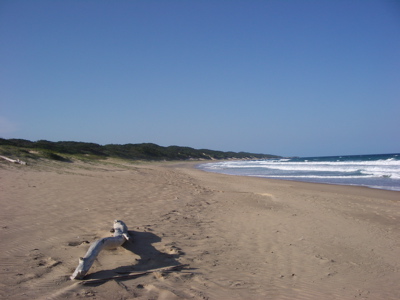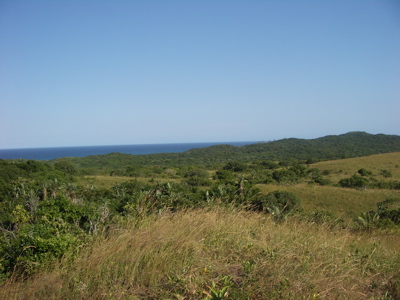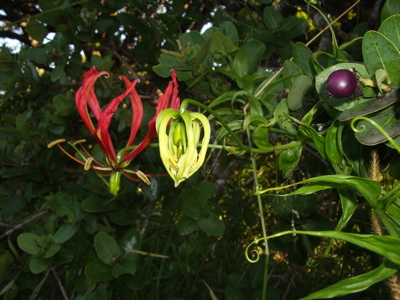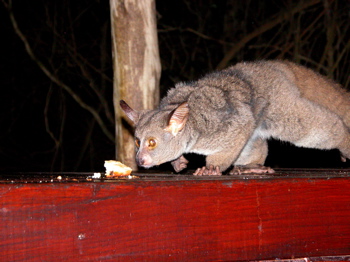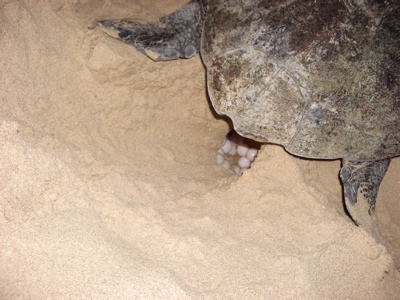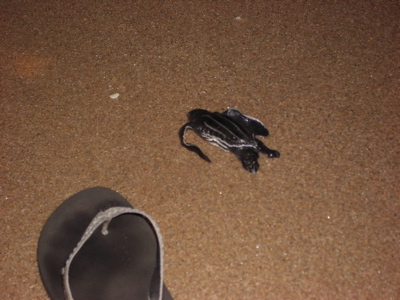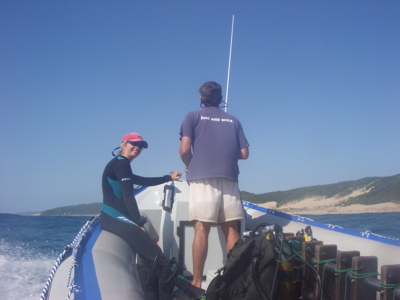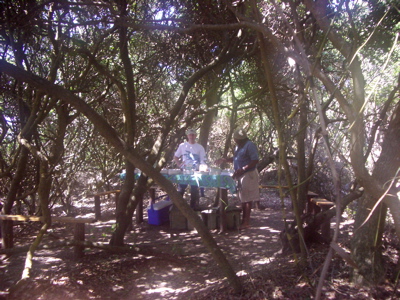
 |
travel@pangolin.liSouth Africa & Swaziland 2005
|
 |
 |
www.pangolin.li Travel Travel RSA&Swazi 2005 RSA&Swazi 2005 Shiluvari/Outpost Shiluvari/Outpost Mopani/Moholoholo Mopani/Moholoholo Panorama Route/ Plains Camp Panorama Route/ Plains Camp Swaziland Swaziland Rocktail Bay Rocktail Bay Picture Gallery Picture Gallery |
|
contact last updated: 17-Jul-2005 Text/pictures subject to copyright by pangolin.li |
 |
 |
||||||||||||||||
Part 5 - Rocktail BayWe had been in Rocktail Bay before and thus made this the end of our holidays, for 5 nights. We drove there directly from Mkhaya, and afterwards back to JNB. Please also see my site from our trip to Rocktail Bay in December 2002. Along cashew and eucalyptus plantations and roads used by logger trucks, we drove eastwards - and suddenly, after one road bend, the eucalyptus gave way to a dense coastal forest. Immediately. This is where Manzengwenya is, the park gate. We first went to say hello to Darryl from the dive center. This is also where we met Serena - JJ had dived with her on Pemba 3 years earlier. Rocktail Bay is then another 30 min drive on a sandy path through the dune forest reserve, by 4x4 (which also means you have to drive 30 min before your dive, on a bumpy road, with the occasional buck or monkey, and this sometimes very early, depending on the tide). Rocktail Bay Lodge is barely seen from anywhere, until you reach it. The lodge and chalets are behind the first dune, to keep people and lights away from the beach - turtle nesting ground. The beach: Imagine 40 km of white sandy beach with green dunes and deep blue sea. And imagine roughly 40 people at this beach... The hosts at Rocktail Bay are very laid-back and friendly - and so were most of the other guests. The chalets are rustic, and surely not brand-new, but cosy and very open, except for the mossie nets. This is the only house I ever slept in where I was woken up because it rained into my bed, with the next window 3 or 4 m away. But there are blinds, if you bother to get up and close them. Except from diving, we did turtle drives and I did a nature walk with James, a guy grown up in Ndumu who really knows the flora and fauna around there. I'm more into plants than into birds, but he must be one of the best bird specialists in the region - at the age of somewhere below 30, I guess! It was the waterberry season, we found sweet sand apples and curry herb, but also many flowers, e.g. a local scabiosa, an astrantia and many flame lilies. Other activities available are a jogging trail, riding, drives to the local community with their sangoma (healer), or to the hippo pools and Black Rock.
TurtlesOne of the main reasons to come here, however, are turtles. Rocktail Bay's pristine beaches attract female leatherback and loggerhead turtles who come to lay their eggs, between October and February. The young hatch from January or so. Rocktail Bay are very serious about their turtles, with a longstanding research programme and two extremely knowledgeable researchers, Gugu and Mbongeni. It is truly impressive to see these massive beasts from dinosaur age haul themselves up the beach, above the waterline, to perpetuate their species - with only 2 or 5 out of 100 hatchlings making it to adulthood.We were never lucky enough to meet a leatherback mum (if you ever stay at the same time in RTB like us, do go on the turtle drive if we decide to go to bed early...), but several loggerhead females and hatchlings of both kinds. More info and pictures from our trip in 2002 are here. There is a brandnew luxury lodge at Mabibi, some kilometers to the South, with the same owners as Plains Camp and Rhino Post Lodge. The lodge seems more comfortable, modern and luxurious than Rocktail Bay - but they also seem much less cautious with the turtles, with having lights all over the beach. I'd still prefer the old charme of Rocktail Bay with their turtle monitoring programme.
Diving at Rocktail BayDarryl, Clive and Michelle operate one of the best dive centers we've ever seen, Mokarran Dive Center. Diving is well-organized and relaxed, and the dive sites are simply superb. Intact and unspoilt, with fish rather curious than tame. Ragged-tooth shark females come to rest there before giving birth, in summer. Whales come during winter. Dolphins to snorkel with. Turtles swimming like angels. Colourful fish and invertebrates and coral. Of course there is a resident whale shark, but it of course went on holiday when we came. As always. Read Darryl's dive newsletters to learn more, they really make you wish to come back... Maximum dephts of the sites we dived are between 12 and 20 m, but there is one going down to 50m. Visibility was always 10-20 m, and temperature was around 27°C, without strong currents. There are 2 dives in the morning, with a bush breakfast and time for a nap in between. Diving is only possible before and after low tide, so sometimes you have to get up very early. The well equipped inflatable boat launches from the beach, steered through the surf by Darryl, and the boatride will take between 5 and 50 min. The highlights of our dives in Hang Ten, Pineapple Reef, Aerial, Elusive and Yellowfin Drop were: a Shortnose Blacktail Reefshark, several Hawksbill, Loggerhead and Green Turtles, hunting Octopus, Feathertail Stingray, Sand Sharks, the very curious Potato Bass, Paperfish.... and all this surrounded by what seems to be an endless aquarium. Unfortunately we didn't see Ragged-tooth sharks this time - they had left the coast after the time of the tsunami (even though the area was not affected from human perspective). More info and pictures from our trip in 2002 are here.
Go back to RSA&Swazi 2005 main page, or go to Travel main page |
||||||||||||||||
 |

